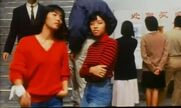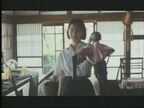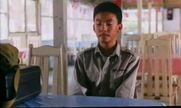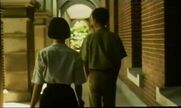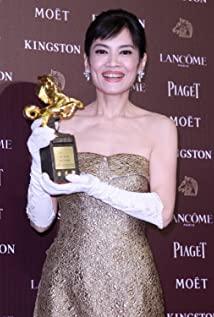In "Guling Street Teenage Murder Case", Zhang Zhen's second sister, while believing in Christianity, also eagerly hopes to help Zhang Zhen get out of the predicament through teachings. It's just that Zhang Zhen ignored the care from his sister, or in other words, just like the second sister in the movie, Yang Dechang also selectively "ignored" this role.
Just like the characters in his movies, NJ, Yangyang, Zhang Zhen... Yang Dechang is confused about why the world is so different from his imagination, and then he is angry and disappointed. Religion cannot convince this firm man who holds the view of what is right to reconcile with the world. of.
"Guling Street Teenage Murder Case" is a heavy footnote to that sensitive and turbulent era. Together with Hou Hsiao-hsien's "Childhood Memories" and other works, we were able to outline the 1960s under the Kuomintang rule in the images given by different authors. of Taiwan. In "Guling Street Juvenile Murder Case", Guling Street is bigger than juveniles, and juveniles are bigger than homicides. The environment takes precedence over people, which is what Yang hopes to reproduce and restore. As the Kuomintang retreated to Taiwan, the entire Taiwanese social elite was taken over by the mainlanders who moved here in an involuntary manner. The contradiction that is difficult to reconcile between locals and people from other provinces is condensed in the film through the silhouette of a night shopping, but under the white terror, locals and people from other provinces are both victims. Zhang Zhen returned home after witnessing the death of Shandong in the shopping mall. The police at the door made the audience also let the eldest sister think that Zhang Zhen, who participated in the shopping mall, was about to be tried, but unexpectedly, the police target was Zhang's father, a public official. Before he got out of the nervousness of gang hacking, the audience was sweating because Zhang's father was facing the system alone at this time. From Zhang Zhen's friend, Elvis, we can also see that Taiwan, which is always the other in geopolitics, is a culturally isolated island. It is no surprise that rock music has become the favorite of young people in Taiwan, as well as sunglasses and Western movies. In the long summer in the movie, these are all very melancholy. And Zhang Zhen and Xiao Ming's important meeting place - the studio where costume dramas are always filmed, has also become a rotten target for the new film's standard bearer to scold. Belonging to the film era of Godard, Truffaut and others, this unknown island is still filming the secret history of the Erotic Palace. Luckily, Elvis himself gave us a sigh of relief during the gloomy and depressing four hours—he thanked someone in one corner of the world for loving his song so much. Of course, what we can summarize is only a small part of this grand image.
Fixed-camera, panoramic shots make up almost the entire movie. The movement and transformation of the camera is full of insensitivity, it does not intend to satisfy our curiosity, it is just silently watching across the street, presupposed to be objective, all we can see is the complex and trivial life, and the world, of course, and Violence. Violence is by no means just the shopping between natives and foreigners in the movie - although it is so realistic, it is different from the rhythmic and breathing action design of action movies, which is almost like a butcher's slashing and disappearing on campus. He was bullied and bullied, his father was tortured to the verge of dementia, and the street murders of teenagers who made a name for themselves in the history of the film, but Yang Dechang put his doubts and questions about the world into Zhang Guozhu's body, and then Zhang Guozhu pushed Zhang Zhen into it. His body was cold and cruel. In almost every work, Yang puts his own difficulties into the characters, begins to perform with such doubts, begins to have a relationship with the world, or refuses to have a relationship with the world. In short, no matter whether they get the desired answer or not, the questioners will leave at the end of the screening, and people will stay out of the matter after a moment of thinking and chewing, and return to their regular and empty lives. In "Guling Street Teenage Murder Incident", the hostility generated by seeking but not being able runs through the beginning and end, and almost all characters are actively or passively heading towards self-destruction. Zhang Zhen's struggle and pain are reflected in his clumsy but pretending to be light steps, and in his unnatural and self-pulling posture when facing adults. Not too big and not too small, he is full of questions that his mind can't bear, and he is exhausted, like a tumbler. In fact, it is more like a tightrope walker, with Hani at one end and Xiao Ming at the other. The appearance of Hani made Zhang Zhen see the possibility of defending against the world and against the "rules". He was almost using his weak body to live on one breath against the world. He had a mind that was different from cats and dogs, and he didn't jump out of it. Maturity and simplicity of mind and intellect. In the dark night, the white sailor suit close to the chest is used to break the tranquility, but this dazzling white still cannot escape the fate of being swallowed by the dark night; Xiao Ming is the other pole of Hani. If Hani is fighting against "rules", then Xiao Ming It is the "rule" itself, which should remain unchanged. Xiao Ming is single-minded, she only does what is beneficial to herself, although her class background and family background give her full moral insurance. Hearing that the little doctor who was interested in her was about to get married, she "confessed" to him plainly that her fiancee was not suitable for him, "...Don't worry, auntie's medical expenses don't have to be worried." Not without a sincere smile suddenly returned to Xiaoming's face, That moment is enough to pronounce a person's personality dead! Hani and Xiao Ming, their influence on Zhang Zhen in his youth is far greater than the dignified and chilling history of that period. When one pole is out of balance, what Zhang Zhen can do It is extremely inhuman to just run to the other pole with all my strength. It took us four hours to witness a young man staggering toward self-destruction. History is probably the only key that can decipher Zhang Zhen's motive for murder, but in this way, history appears to be extremely weak and pale, flat and distorted. In other words, establishing clear causal coordinates based on social history, locating characters and events, and reasoning about motives and trends, then the era behind the story will become a complete background in the movie. We need the courage and patience to face the life in the movie, and appreciate the state of mind of Zhang Zhen or others at that time, rather than relying on historical information to get answers urgently.
If Zhang Zhen is regarded as the director himself, the biggest thing in common is that they are more or less in conflict with the environment and become the other. He studied in the United States, came from an engineering background, and returned to Taiwan to work as a filmmaker... Also as a descendant of a native from other provinces, Yang Dechang may be a double or even multiple other on this land in many aspects. nostalgia. "Dream of Life" is probably the clearest work by Hou Hsiao-hsien on the relationship between traditional Chinese and the land: the perspective does not start from the characters, but does not return to the author. Look at Hou Xiaoxian's arrangement of puppet shows: villagers can watch the play in their spare time, and the stage is in the same frame as the villagers; on the contrary, the Japanese use puppet shows to promote militarism and colonial education, and give them to Zhongjing, Jingjing, etc. The villagers no longer appear in the box. This is not only Hou's statement on the colonists' use of puppetry as a tool for ideological brainwashing, but also a refinement of other images in the film: Japan's highly formalized ritualization is ineffective when faced with this red soil, and it is even eventually destroyed. devoured. The colonists' white uniforms and sun-stamped flags appear so insignificance when marching on the dusky terraced fields. This is the character and aura of this land: simple, taciturn, honest, but full of energy, enough to digest impurities that do not belong here. The texture of the foyer in the indoor play is shiny and silky under low-light photography, which is created by the struggle between people and space in time. To put it bluntly, Taiwan in Hou Hsiao-hsien’s films is the land, where things that people can’t understand are happening all the time. It is so vast and soft that the response to shouting and accusation is just the usual silence, so when it is huge When their life energy is exhausted in the struggle with life, the land turns into a riverbed, watering the ravines in their hearts, giving birth to new life again; and Taiwan in Yang Dechang's eyes is always swaying between what it should be and what it is. Struggles and whines in this sway, but never cynically turns a blind eye to the questions raised. To paraphrase a sentence from "The Sun Also Rises": "You can only say that you don't understand, but you can't say that you didn't see it." Perhaps it is just like Zhu Tianwen, who has worked with him for many years, Hou Hsiao-hsien is an essayist and writer. He is touched by the people and things on the land; Yang Dechang is a scientist and a great intellectual, and there are probably few people in the Chinese world who can match him in raising questions.
Writing this is neither a serious evaluation of "Guling Street Teenage Murder Case" nor a sketch of Director Yang Dechang. I don't have the right to give even one or two compliments that set the tone. I can only record the special four hours of my life through what this film has come up with.
View more about A Brighter Summer Day reviews



